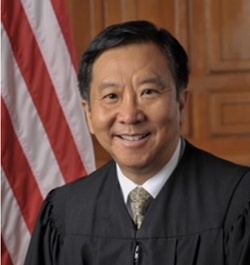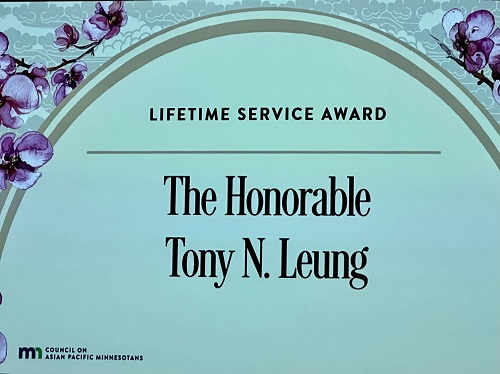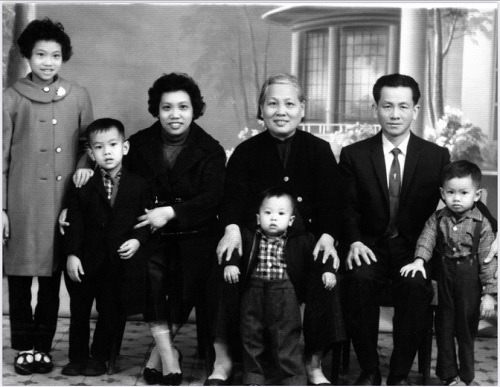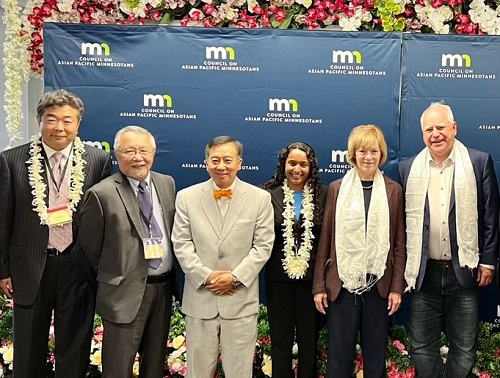Community and State Luminary, U.S. Magistrate Judge, Tony N. Leung
 Tuesday, December 13, 2022 at 2:48AM |
Tuesday, December 13, 2022 at 2:48AM |  Becky Fillinger |
Becky Fillinger | Article by Becky Fillinger, photos provided
 Judge Tony N. LeungWe are a nation and community of immigrants. Some immigrants achieve success on a level that elevates them to luminary status. Meet Judge Tony Leung, a member of our community who recently was awarded the 2022 Lifetime Service Award by the state Council on Asian Pacific Minnesotans. His list of awards and achievements is lengthy – take a look. In a discussion with Judge Leung, we talked about his career highlights, tips for success and what he likes to do in his free time.
Judge Tony N. LeungWe are a nation and community of immigrants. Some immigrants achieve success on a level that elevates them to luminary status. Meet Judge Tony Leung, a member of our community who recently was awarded the 2022 Lifetime Service Award by the state Council on Asian Pacific Minnesotans. His list of awards and achievements is lengthy – take a look. In a discussion with Judge Leung, we talked about his career highlights, tips for success and what he likes to do in his free time.

Q: Congratulations on receiving the 2022 Lifetime Service Award as part of the Asian Pacific Minnesotans Leadership Awards. In your illustrious career, you have been a trailblazer in many areas. In the interest of space and time, I will present a truncated list of your many accomplishments:
- Emigrated to the US from Hong Kong when you were six years old. You learned to speak English in your first U.S. home in Aurora IL.
- Co-Valedictorian and President of the Student Council in 1978 at West High School in Minneapolis.
- Graduated with honors from Yale University with a degree in Political Science in 1982.
- Graduated from New York University School of Law in 1985 and began a legal career at Faegre & Benson (now Faegre, Drinker Biddle & Reath) in Minneapolis, becoming an equity partner at the firm.
- Appointed as District Court Judge for the Fourth Judicial Circuit in Minnesota in 1994, the first Asian Pacific judge in Minnesota.
- Sworn in as a United States Magistrate Judge for the United States District Court for the District of Minnesota in 2011, becoming the first Asian Pacific American to serve as a federal judge in Minnesota. You still serve in this capacity.
- President of the Federal Bar Association Minnesota Chapter from 2019-2020.
- Co-founder of Minnesota's Chapter of the National Asian Pacific American Bar Association in 1990.
- Board member of Twin Cities RISE! for 25 years, beginning in 1995, and as Chair of the Yale Alumni Schools Committee in Minneapolis since 1991.
- Co-founder and first Board Chair of Twin Cities Diversity in Practice in 2005.
- Board member of Wishes & More, Northern Star Council, Boy Scouts of America, and Lakewood Cemetery Association.
- Lecturer as part of the University of St. Thomas's Great Books Seminar for business and law students since 1998.
 Family photo from 1962 in Hong Kong. From left to right: sister Alice, brother Nelson, mother Carol, grandmother Yook Quay Lee, me in front of my grandmother, father Victor, and brother Ron.
Family photo from 1962 in Hong Kong. From left to right: sister Alice, brother Nelson, mother Carol, grandmother Yook Quay Lee, me in front of my grandmother, father Victor, and brother Ron.
Q: Has there been one segment of your career that stands out as most significant to you, that changed you and inspired you to keep achieving? Any tips you can share with us to stay motivated to accomplish our goals?
A: My years at Faegre & Benson, now Faegre, Drinker, Biddle & Reath, were the most transformative years of my career. The transition from school to work was significant. I learned at Faegre that having success in a career needed more than intelligence, but required hard work; perseverance through long hours; organization to juggle many files at one time and to keep track of all the smaller components and details that make up large and complex business deals; integrity that permits others to trust in you to take care of their client; EQ skills within the law firm and outside for business development; risk analysis; and so much more.
I also learned at Faegre that no matter how good we might think we are, we are imperfect and we will screw up. And, I goofed up more than my fair share. That’s where mentorship and having a network of supportive friends and peers came in. Mentors, preferably those who are well respected in the firm or other work places, are the ones who back you up when you screw up. They provide guidance on how to do better, and it means something to others in the organization when they say, "That was me when I was at that point of my career."
I had so many mentors in the firm that keep me alive through partnership. Tom Crosby, whose background for those who knew him was totally different from mine except that we were both Eli, gave me so many different types of legal work, from real estate to family disputes to putting together the Burnet Senior PGA Classic. In retrospect, that diversity of exposure to different legal problems was great training for the vast number of different legal issues I would later encounter as a state general jurisdiction trial judge and now as a U.S. Magistrate Judge. Charlie Ferrell, one of the best real estate transaction lawyers anywhere, taught me about how to be a lawyer and saved me from getting the boot more times than I care to admit.
Peers were also essential for survival. When down or discouraged at work, these were the contemporaries on whose shoulders one could cry. These were other associates in same firm or at other firms who understood challenges because they were going through the same thing. Being a lawyer of Asian Pacific ancestry carried some different challenges, too. I found a unique affinity with other Asian Pacific American lawyers and lawyers of other racial backgrounds. That’s why I was so involved earlier in my career with various minority bar associations – there just weren’t that many minority lawyers then and we all had to support each other.
One group I was in early in my career, that’s not listed in the list above, was the Twin Cities Committee on Minority Lawyers in Large Law Firms, which Jerry Blackwell chaired and other board members included B. Todd Jones, Fredilyn Sison, Jeff Crawford, Jeff Eng, a number of others and me. We were then all associates in large law firms. That group first started the MN Minority Job Fair. That group also first published a list of how many attorneys of color were then in Minnesota’s various big law firms. Publication of that data has recently been revived in a much bigger way by a group called the Minnesota Coalition of Bar Associations of Color. In addition to data on big law firms, MNCBAC also includes data on the number of diverse attorneys in a number of large corporations and metro-region public legal departments. The first year of the MNCBAC data reveal was hosted by Ivan Fong then of 3M, second year by Anna Richo of Cargill, and in 2022 by Don Liu of Target.
For what it’s worth, my tips for staying motivated and to accomplish goals would be: read to increase knowledge and IQ, work hard, persevere, organize, be trustworthy and reliable, listen to others to develop EQ, and find mentors and peers for support.
Q: Your tips are very appreciated! I’d like to ask you about an international exhibit on Jewish refugees in Shanghai – can you tell us about your involvement and some background on the exhibit?
A: The mastermind of that program was Steve Hunegs, a great lawyer, and long-serving Executive Director of the Jewish Community Relations Council of Minnesota and the Dakotas. He and the JCRC team did all the heavy lifting. I and others of the Chinese community merely provided input whenever Steve asked. It was a story that needed to be told, not only in Minnesota and America, but also in China. We all know the horrors that the Jews suffered in WWII. But, it didn’t happen overnight. As the power of hatred rose in the 1930s in Germany, and even before that in other parts of Europe, Jews knew what was happening to them and other groups disfavored by the Nazis. Many tried to find safe havens outside of Germany. But, not many cities wanted Jewish refugees or, I suspect, Jews in general. Shanghai was one of the cities where Jews could find shelter from a storm of mortal dangers. The Jewish Refugees in Shanghai program shed light on that important story. It also shed light on the fact that there was a Jewish foothold in Shanghai that started years earlier, initially with Sephardim from Bagdad, then Ashkenazim, and later Jews from other parts of Central Europe. Some of the most influential merchants in Shanghai were Jewish: the Sassons, Kadorories, and others. The Jewish Refugees in Shanghai program highlighted the importance of remembrance, tolerance, and how small the world really is.
Q: I attended a program you were involved with in 2019 - the Pitfalls for STEM Professionals in a New Era of U.S.-China Relations. Can you share with our audience the main ideas in this program and give us an update on the issue?
A: The full program name was a descriptive mouthful: Pitfalls for STEM Professionals in a New Era of U.S.-China Relations: National Security, Economic Espionage, Racial Bias? The background for the April 4, 2019 program was that China was involved in 90 percent of all economic espionage cases handled by the Department of Justice over the last seven years, according to a December 2018 report to the U.S. Senate Intelligence Committee. This fact illustrated a new backdrop for thousands of Twin Cities STEM (science, technology, engineering, and mathematics) professionals of all ethnicities navigating career opportunities and avoiding pitfalls in the 21st Century of U.S.-China relations. The program’s goal was to educate all Twin Cities STEM professionals, academics, and students—many of whom are Asian American—on two competing and ever-emerging phenomena in the U.S. justice system: potential threats to national security and economic espionage with the ascendancy of China on the one hand, and on the other, the potential racial profiling of Asians and Asian Pacific Americans resulting in accusations, such as those against Dr. Wen Ho Lee, who was represented by program panelist Brian A. Sun; and Professor Xiaoxing Xi and National Weather Service hydrologist Xiafen Sherry Chen, who were represented by another program panelist, Peter R. Zeidenberg. The third program panelist was Jay Bratt, then the Department of Justice’s Chief of Counterintelligence and Export Control Section of the National Security Division. I was the panel moderator and one of the organizers.
Lots of helpful people and organizations made the program possible. Sponsors included the United States District Court for the District of Minnesota’s Outreach Committee, the US Department of Justice, the FBI’s Minnesota office, the Federal Bar Association’s Minnesota Chapter, University of Minnesota’s China Center, and Kingsfield Law Firm, along with the U.S. Attorney’s Office for the District of Minnesota, Minnesota National Asian Pacific American Bar Association, and China Insight.
 From right to left: Governor Tim Walz; U.S. Senator Tina Smith; Council on Asian Pacific Minnesotans, Chair-Elect, Saraswati Singh; Judge Tony Leung; Greg Hugh, China Insight publisher and “Outstanding Contribution Award” winner; Council on Asian Pacific Minnesotans Vice-Chair Elect, Chang Wang.
From right to left: Governor Tim Walz; U.S. Senator Tina Smith; Council on Asian Pacific Minnesotans, Chair-Elect, Saraswati Singh; Judge Tony Leung; Greg Hugh, China Insight publisher and “Outstanding Contribution Award” winner; Council on Asian Pacific Minnesotans Vice-Chair Elect, Chang Wang.
Q: Do you have a ‘bucket list’ of goals yet to be achieved? Or perhaps a wish of yours for the future?
A: I don’t have a bucket list. My wish for this country and the world - it’d be racial equality. Since even before this country was a country, race has cursed this nation. If I had one wish, I would wish that all people spent time together, free from want, and that we would help, listen, and try to understand each other.
Q: The last several years have seen an uptick in violence against Asian Americans. A report from Stop AAPI Hate has found that between March 2020 and March 2022, more than 11,400 hate incidents against Asian Americans were reported across the United States, marking the continued surge of hate incidents against them. This continues the harassment, verbal abuse and hate speech that have plagued Asian communities since the beginning of the COVID-19 pandemic. Are you able to use your platforms to address the acts of hate against Asian Americans? Could you tell us your thoughts on this problem?
A: I don’t have a platform. Nor do I speak as a judge. I speak only in my individual capacity. I believe that in the past several years there has been a rise of racism directed against Asians, especially against those of Chinese heritage. Unfortunately, political opportunism and the weaponization of group politics has exploited fear and scapegoated Asians, especially the Chinese, for a whole panoply of America’s ills, from COVID-19 to job insecurity to national security. But, this is not new in America. The historic experience of Asians in America is one of ambivalence: in times when the economy is good and labor is needed, Asians are looked upon favorably, but when the economy is bad or there is a real or perceived external threat to U.S. security, then Asians are viewed through racist lens as unwelcome foreigners. For examples, learn about the Chinese Exclusion Act of 1882, the Incarceration of Japanese Americans during WWII, and hate crimes against Vincent Chin and now expressed in examples of random violence against Asians just waiting for a bus, walking down the street, or in a subway station.
Q: You are incredibly busy and productive, but I must ask - what do you like to do in your free time?
A: I watch a lot of news and sports, cook, and listen to opera in my free time. Though I didn’t go to Notre Dame, my brother Ron did, and we watch almost all the Notre Dame football games together. I follow soccer, especially when the World Cup is on. My favorite is grand opera from Italy, France and a few German pieces. The works of Puccini, Mozart, Verdi, Mascogni, and Bizet stand out. Bjoerling, Pavarotti, Gigli, Sutherland, Moffo and Tebaldi are some my favorite voices. My favorite Cantonese opera singer is Sun Ma Sze Tsang. I’ll read more after I retire.
Q: Thank you so much for speaking with me. How may we follow your news?
A: I have to confess I’m not too news worthy so there’s not much to follow.
My latest additional responsibility, however, is being the Chair of the Lakewood Cemetery Association. I could go on and on about what a treasure Lakewood is to our community, but that will have to be saved for another day. Lakewood is currently building a wonderful and long needed new Welcome Center, which has been designed to have a “net zero” energy use, meaning it seeks to produce as much energy as it uses. If you follow me and see a big smile on my face, it’ll mean that the Lakewood Welcome Center is on time, within budget, and exceeds expectations.
